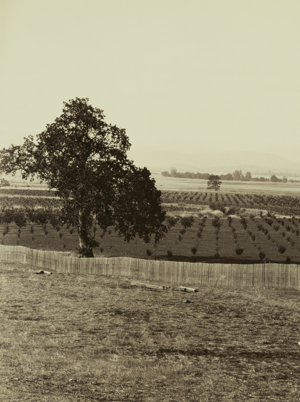Mary Ann Borina Radovich
This oral history, conducted with Mary Ann Borina Radovich on June 7 and June 22, 1977, focuses on Radovich’s extensive experience as an apple farmer in Watsonville, California from the 1930s to the 1970s. It is also a significant contribution to the ethnic history of the Croatian community in the Pajaro Valley of California.
In this oral history Radovich discusses her family’s history and their emigration to the United States. She describes the early apple industry in Watsonville, and the changes that took place over the years in terms of labor, mechanization, irrigation, crop varieties, pest control, harvesting, and land use. Her detailed and reflective narration makes this oral history a singular contribution to the agricultural history of Central California.
Radovich owned Borina Orchards from the 1940s through the time of this interview in 1977, and beyond. For many of those years her husband, Rafael Radovich, was her business partner, and in fact beginning in 1957 he was primarily responsible for the apple business. They had no children. In 1977 the orchard was about one hundred acres, mostly planted in dwarf apple trees. They grew Pippin and Delicious apples.
Date of Interview
Interviewer
1977-06-07
Meri Knaster
Project
Program/Repository
All uses of these manuscripts are covered by copyright agreement between the interviewees and the Regents of the University of California. Under “fair use” standards, excerpts of up to six hundred words (per interview) may be quoted without the Regional Oral History Project’s permission as long as the materials are properly cited. A sample citation would read: “Excerpted from Rebecca Thistlethwaite: TLC Ranch and the Agriculture & Land-Based Training Association, a transcribed interview conducted by Sarah Rabkin and included in Cultivating a Movement: An Oral History Series on Organic Farming and Sustainable Agriculture, published by the University of California, Santa Cruz Library’s Regional Oral History Project, 2010: http://library.ucsc.edu/reg-hist/cultiv/home).” Quotations of more than six hundred words require the written permission of the University Librarian and a proper citation and may also require a fee. Under certain circumstances, not-for-profit users may be granted a waiver of the fee.

It’s a lot of hard work. I don’t know of anything that has come easy. Everything that I’ve done or accomplished has come because I put a lot of thought into it.